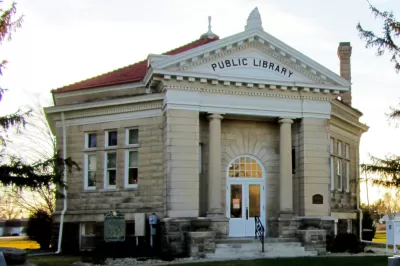Richard Florida talks with sociologist Eric Klinenberg about his new book and the places and organizations that help hold society together.

In Palaces for the People, Eric Klinenberg explores the idea of “social infrastructure,” the physical sites, institutions, and groups that are essential in developing a cohesive social fabric. In a conversation with Richard Florida, he describes social infrastructure’s importance and what happens when it frays:
When social infrastructure is robust, it fosters all kinds of social interactions, helps build relationships, and turns community from a vague, fuzzy concept into a lived experience. When social infrastructure is degraded and neglected, it makes it far more likely that we will grow isolated and be left to fend for ourselves.
Klinenberg says social infrastructure is as important to a well-functioning society as other types of infrastructure – water, energy, transportation – and it is made up of a range of private and public places. Childcare facilities, athletic fields, and schools all foster social interaction. The public library is an especially significant part of social infrastructure, says Klinenberg:
It provides a variety of services and public benefits for people of all ages and stations, regardless of social class, regardless of race or ethnicity, regardless of citizenship status. They’re amazing institutions that would be kind of inconceivable if we didn’t already have them. It’s hard to imagine this notion that every citizen has a right to their cultural heritage and to access a free place where they can better themselves outside of the market coming from a moment like this.
Klinenberg believes that social infrastructure, while not a panacea for society’s problems, does provide a sense of shared experience that is integral to repairing our divided society. In addition, he thinks that the strengthening of social infrastructure happens not at the highest levels of society but rather through public engagement in grassroots efforts.
FULL STORY: How ‘Social Infrastructure’ Can Knit America Together

Maui's Vacation Rental Debate Turns Ugly
Verbal attacks, misinformation campaigns and fistfights plague a high-stakes debate to convert thousands of vacation rentals into long-term housing.

Planetizen Federal Action Tracker
A weekly monitor of how Trump’s orders and actions are impacting planners and planning in America.

In Urban Planning, AI Prompting Could be the New Design Thinking
Creativity has long been key to great urban design. What if we see AI as our new creative partner?

How Trump's HUD Budget Proposal Would Harm Homelessness Response
Experts say the change to the HUD budget would make it more difficult to identify people who are homeless and connect them with services, and to prevent homelessness.

The Vast Potential of the Right-of-Way
One writer argues that the space between two building faces is the most important element of the built environment.

Florida Seniors Face Rising Homelessness Risk
High housing costs are pushing more seniors, many of them on a fixed income, into homelessness.
Urban Design for Planners 1: Software Tools
This six-course series explores essential urban design concepts using open source software and equips planners with the tools they need to participate fully in the urban design process.
Planning for Universal Design
Learn the tools for implementing Universal Design in planning regulations.
Gallatin County Department of Planning & Community Development
Heyer Gruel & Associates PA
JM Goldson LLC
City of Camden Redevelopment Agency
City of Astoria
Transportation Research & Education Center (TREC) at Portland State University
Jefferson Parish Government
Camden Redevelopment Agency
City of Claremont



























